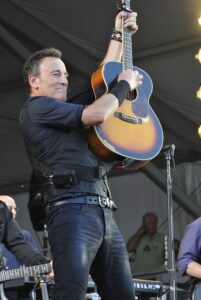By David Wilkening, Contributing Writer

Photo/Takahiro Kyono
BOSTON – The Boston area is certainly best known for its role in the American Revolution, but two centuries later, in 1974, it was center stage for what has been called one of the most significant meetings in modern musical history. Two prominent figures―one of them now one of the biggest rock stars in the world―got together across the Charles River in Cambridge, at the old and now defunct Harvard Square Theatre. Appropriately enough, the theatre is located just two blocks away from where another “boss,” not a musician but George Washington himself, took over the Revolutionary army.
Music critic helped catapult Springsteen to fame
The Harvard Square Theatre meeting on Church Street involved a then-obscure New Jersey musician who would soon be famous: Bruce Springsteen. The man he met at the theatre, Jon Landau, had his own successful career but never was as well-known as Springsteen. Born in New York City, Landau moved with his family to Lexington at the age of 12. He attended Lexington High School and Brandeis University in Waltham.
“When Springsteen performed at the Harvard Square Theater in Cambridge that spring, his life—and the future of rock and roll—changed forever,” said the site Mass Movement.
Musician’s early struggles
Springsteen was then still just one of hundreds of young rock musicians hoping to make it big. His early work had earned him a small but devoted following. He had a contract with Columbia Records but his career was still in a rocky stage.
“In May of 1974, there seemed little prospect that the young singer would ever become a star,” wrote the site.
Boston music critic Jon Landau was in the audience on May 9. He was known for spending much of his time at Brandeis University in the 1960s listening to rock ‘n’ roll rather than studying. He played in a band in 1965 and 1967 called Jellyroll. The failure of that band apparently turned him to music criticism. He became a regular writer for Rolling Stone and The Real Paper, a Boston alternative newspaper. In an issue of The Real Paper, he made Bruce Springsteen a star.
The article that changed everything
“Tonight,” his Springsteen-praising column began, “there is someone I can write of the way I used to write, without reservations of any kind.” Of Springsteen’s concert in Harvard Square, he wrote: “On a night when I needed to feel young, he made me feel like I was hearing music for the very first time. When his two-hour set ended I could only think, can anyone really be this good, can anyone say this much to me, can rock and roll speak with this kind of power and glory? And then I felt the sores on my thighs where I had been pounding my hands in time for the entire concert and knew that the answer was Yes.”
Landau called Springsteen a “truly great performer” in every way. There is no one I would rather watch on a stage today,” he wrote.
Columbia Records took notice of Landau’s review. Rolling Stone and other papers were soon trumpeting Landau’s endorsement: “I have seen rock and roll’s future and its name is Bruce Springsteen,” declared full-page ads. But the meeting between the two had even more far-reaching consequences. It marked the beginning of a relationship between Springsteen and Landau that would be key to transforming the singer into a superstar.
Landau joins Springsteen’s team
In October of 1974, Springsteen returned to Boston to play at the Music Hall. After the concert, he and Landau discussed how Springsteen could move forward. Landau joined Springsteen’s management team as co-producer. With Landau behind him, Bruce Springsteen recorded “Born to Run,” the first of his records to go platinum, selling over a million copies.
“The Boss” went on to fame and fortune. And Landau became his manager and produced his records till 1992. At the singer’s induction into the Rock ‘n’ Roll Hall of Fame in 1999, he acknowledged the former rock critic and now a manager for other musicians.
“What I hope to give my fans with my music―a greater sense of themselves, and greater freedom―he with his talents and abilities has done that for me,” Springsteen said of Landau. “There’s no ‘thank you’ tonight that’s gonna do the job, and it’s a debt that I can’t repay, and one that I treasure owing.”
RELATED CONTENT:












